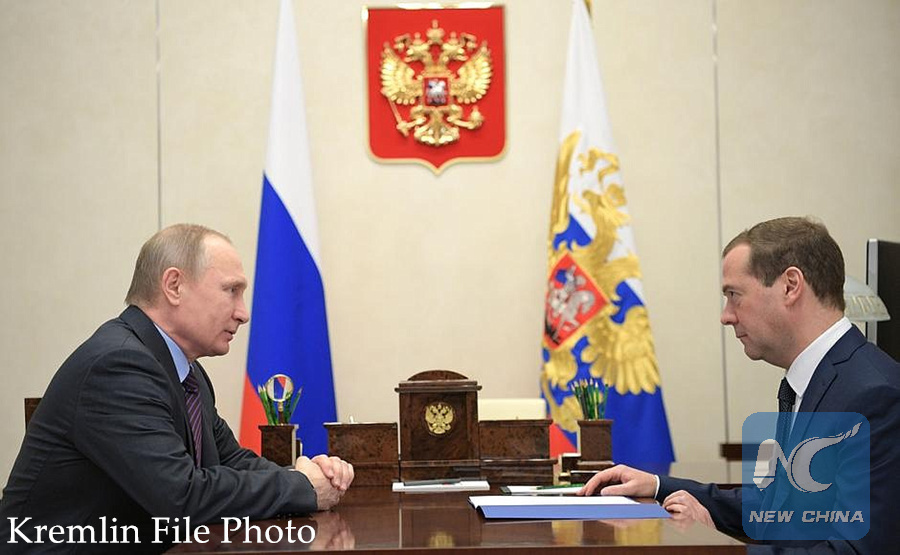
Russia's President Vladimir Putin (L) meets with Prime Minister Dmitry Medvedev at the Novo-Ogaryovo state residence outside Moscow, Russia April 17, 2017. (KREMLIN PHOTO)
MOSCOW, May 18 (Xinhua) -- Russia's budget deficit this year is expected to be 2 percent instead of planned 3.2 percent due to higher than expected revenues, Russian Prime Minister Dmitry Medvedev said Thursday.
"Budget revenues rose by almost 22 percent in the first 4 months of this year, compared to the same period last year in nominal terms, and we expect this trend to continue," Medvedev said at a government meeting.
He said that total budget revenues might increase by more than one trillion rubles (17.2 billion U.S. dollars) this year.
According to Russian Finance Minister Anton Siluanov's report at the meeting, budget revenues in 2017 were now expected to rise by 1.14 trillion rubles from previously planned 13.49 trillion rubles.
Recalling that the previous budget was calculated on the basis of conservative estimates of economic development, Medvedev said it needed to be revised since positive changes that appeared at the end of last year remain, including recovering domestic demand and increasingly positive investment dynamics.
"We expect that by the end of this year these changes will become more noticeable, including GDP growth, which is forecasted at a more significant level - from 1 percent to 2 percent, whereas earlier we expected 0.6 percent," the prime minister said.
Russia's GDP grew by 0.5 percent year-on-year in the first quarter of 2017, marking the second straight quarter of positive economic growth, the Federal State Statistics Service said on Wednesday.
Meanwhile, the government has lowered its estimate of inflation for this year to 3.8 percent instead of 4 percent and raised its estimate of average price of oil to 45.6 dollars per barrel against 40 dollars per barrel previously accounted for in the budget, Siluanov said.
Higher revenues will allow the government to spend its reserves more slowly from both the National Welfare Fund and the Reserve Fund, Medvedev said.
It will also allow an increase in the funding of the country's industry, including transport, special machinery and transport infrastructure, and raise subsidies for manufacturers of high-tech products and agricultural producers, he said.
The financing of the pension system, expenditures on high-tech medical care and protection of maternal and child health will also increase, he added.

